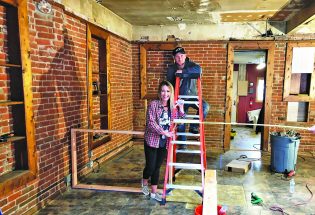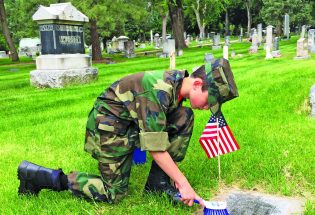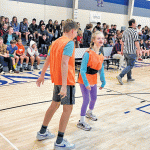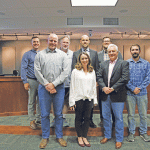New Bites – January 20, 2022
*Total COVID-19 Cases: 63,978 (+5,107)
Total Cases in Berthoud: 2,911 (+214)
Deaths in Larimer County: 425 (+13)
7-day case rate per 100k: 1,375 (-54)
Hospital Utilization: 77%
ICU Utilization: 107%
7-Day test positivity rate: 27%
Risk Score: High
COVID patients in hospital: 90 (+4)
17.32% of the population of Larimer County has been reported to have contracted the virus. Deaths attributed to the virus comprise 0.66% of reported cases. Of reported deaths, 24% were age 75 to 84, 21% were 65-74 and 38% were 85 and older. Twenty-seven people in the county between the ages of 18-54 have died.
As of Monday, Jan. 17, there have been 598,280 doses of the vaccines administered in Larimer County. 78% of eligible county residents have received at least one dose of the vaccine.
*Case data as of Wednesday.
++++++++++++++++++++++
Residential households in the U.S. can order one set of 4 free at-home tests from USPS.com. There is a limit of one order per residential address. One order includes four individual rapid antigen COVID-19 tests. Orders will begin to ship in late January.
The process is quick and simple taking less than a few minutes. Fill in this form with your contact and shipping information to order your tests at special.usps.com/testkits.
++++++++++++++++++++++++++
As the number of COVID-19 cases in Colorado continues to remain high, the Colorado Division of Homeland Security and Emergency Management will offer KN95 and surgical-grade masks for free in community centers across the state.
There is a limit of five masks per person per month and they will be available starting Jan. 20.
In Berthoud, masks will be available at the Berthoud Community Library District located at 236 Welch Ave. just east of the railroad track.
According to the Polis administration, free masks are part of an ongoing effort to provide high-quality protective equipment to Coloradans who are at high risk during the pandemic.
“We are on a mission to help Coloradans keep themselves safe, and free medical grade masks are far more effective in preventing infection than cloth masks. By making free medical-grade masks available at libraries across our state and soon for home delivery, we are giving Coloradans a powerful tool to avoid infection,” Polis said.
++++++++++++++++++
Thompson Valley EMS paramedics are now able to provide monoclonal antibody treatment to high-risk populations that are currently infected with Covid-19 in their own homes. The treatment provides extra antibodies that are lab-created to help the body fight the virus and has been shown to reduce symptoms and the risk of hospitalization by up to 80 percent.
Patients who qualify for this treatment include those who have had mild to moderate symptoms for less than 10 days, have tested positive for the Covid-19 virus, are at high risk for developing severe symptoms and have a referral from a physician of The Larimer County Health Department.
Once TVEMS receives the referral from the patient’s physician, paramedics will call to schedule a time to administer the IV therapy in the patient’s home. The IV Infusion takes around 30 minutes and the paramedic will monitor the patient for an hour afterward.
In a statement from TVEMS Chief Randy Lesher said, “The Administration of monoclonal antibodies in the home is another example of our CARES program meeting the needs of our Health Service District beyond 911 medical response. It is through this type of healthcare delivery program that we will improve the health status of the residents in the community we serve.”
Residents in Berthoud, Loveland and into the Big Thompson Canyon may be eligible to receive the at-home treatment.
+++++++++++++++++++++++++++
Larimer County is hosting a COVID Conversation with members of the Board of County Commissioners and Larimer County Department of Health & Environment to discuss current measures and metrics, as well as address questions. The meeting will take place virtually on January 25 at noon.
Register in advance for this webinar by visiting:
larimer-org.zoom.us/webinar/register/WN_lB50aaMPR4WxJPsHhr6J1w
After registering, you will receive a confirmation email containing information about joining the webinar.
++++++++++++++++++++++++
Rocky Mountain National Park will be implementing a pilot temporary timed entry permit reservation system beginning on May 27, 2022. The reservation permit system is similar to that used in 2021. Two types of reservations will be available. One permit will be for the Bear Lake Road Corridor, which includes the entire corridor, as well as access to the rest of the park. This reservation period will be from 5 am to 6 pm. The second permit will be for the rest of Rocky Mountain National Park, excluding the Bear Lake Road corridor. This reservation period will be from 9 am to 3 pm. Permits issued using the reservation system will allow park visitors to enter the park within two-hour windows of availability. The reservation system will apply to all areas of the park.
Reservations to enter the park will go on sale through www.recreation.gov at 10 am Mountain Daylight Time on Monday, May 2. This round of reservations will be available to enter the park from May 27 through June 30. The next release will occur on June 1, for the month of July and any remaining days that have not been booked for June. On July 1, reservations will be available for the month of August and any remaining days that have not been booked for July. On August 1, reservations will be available for the month of September and any remaining days in August that have not been booked. On September 1, reservations will be available for October and any remaining days in September that have not been booked.
Initially, 30 percent of permits will be held and available for purchase the day prior at 5 p.m. through recreation.gov. These are expected to sell out quickly and visitors are encouraged to plan ahead when possible.
This year’s pilot reservation system allows for a greater number of reservations per day. Reservations will be based on approximately 90 percent of the park’s total parking capacity. Last year’s system was based on approximately 75 to 85 percent of the park’s total parking capacity. This system spreads use throughout the park and throughout the day to better utilize all parking/trailhead areas.
There are several different reservation systems that are being implemented across the National Park Service. Other national parks that have announced various types of reservation requirements this year include Arches National Park, Glacier National Park, Acadia National Park, Muir Woods National Monument, Shenandoah National Park, Haleakala National Park and Zion National Park.
++++++++++++++++++++
If you’ve ever said “It’s uncomfortable”, “I’m only going a few blocks”, or “I’m a safe driver” when not wearing a seat belt, the Colorado State Patrol wants to have a heart to heart. Colorado drivers are below the national average when using seat belts, and you are part of the problem.
“Looking at our 2021 data, we’ve definitely noticed who is less likely to use this proven, life-saving device,” stated Matthew C. Packard, Chief of the Colorado State Patrol. “Colorado State Troopers responded to more serious injury and fatality crashes involving improper use or no use of seatbelts with our male drivers between the ages of 20 – 39 than any other group.”
Recognizing the dangers of not wearing a seatbelt, law enforcement does issue tickets as a form of education to motorists for seatbelt violations when being pulled over for other traffic infractions. In 2021, the Colorado State Patrol issued over 14,590 seat belt citations. Of those drivers, 3,780 were female and 10,810 were male.
“Getting thrown from a vehicle or getting tossed around violently inside during a crash will probably only happen once in your lifetime,” explained Chief Packard. “We aren’t made of steel and it can happen to you. Please, buckle up; your seatbelt could save your life.”
According to the National Highway Traffic Safety Administration (NHTSA), seat belts reduce the risk of injury or death in a crash by 50%. Yet the Colorado Department of Transportation’s (CDOT’s), most recent statistics show that Colorado’s seat belt use rate is 86 percent — well below the national use average of 90 percent
+++++++++++++++++++++++++++
Colorado Gov. Jared Polis and Commissioner of Education Katy Anthes urge all school-based educators and support staff to complete the statewide survey of teaching and learning conditions, which will be available Wednesday, Jan. 19, and will remain open for a month.
Results from the Teaching and Learning Conditions Colorado Survey provide school, district and state policymakers with reliable data on teaching and learning conditions in public schools throughout the state. The results from the anonymous survey can give leaders information on areas that deserve attention in the school environment.
“The last few academic years have been particularly difficult for the people who work so hard for our schools and students,” Gov. Polis said. “Our state is fortunate to have such incredible educators, but we know they can’t continue their work without support. The quick and confidential TLCC survey will help us learn more about the challenges and opportunities taking place in classrooms. Feedback we receive from the survey will be used to make policy decisions at the state level and inform school improvement efforts. On behalf of all Coloradans, I sincerely thank all educators and school support staff for their service to our children and their families.”
For the first time, in addition to all school-based educators, education support professionals are eligible to participate in the survey as well, adding approximately 24,000 more eligible respondents. This group includes paraprofessionals who may not be licensed but provide direct instruction and support licensed staff.
Results from the 2022 survey will show trend data with statewide comparisons back to 2015. The TLCC survey was last administered in January 2020, months before the COVID-19 pandemic. More than half of the state’s educators took the survey in 2020, giving administrators and policymakers an inside look at what educators think is working and what needs to change in their schools. To take the survey and view previous year’s results visit tlccsurvey.org.
+++++++++++++++++++++++++++
During the winter it is not just ice fishing, but several other winter activities that may take place on the hard water. Colorado Parks and Wildlife reminds everyone to educate themselves on ice safety guidelines to follow, and to have the proper equipment you need for a safe and enjoyable experience on our frozen ponds, lakes and reservoirs.
According to Colorado Parks and Wildlife first, always assume that unsafe ice conditions may exist. In Colorado, ice conditions can vary from lake to lake. Along the Front Range, it is especially important that anglers check ice conditions before heading out because of the region’s notoriously variable weather conditions. Anyone going out onto the ice should drill test holes to measure thickness as they venture out.
“Good, solid clear ice is the safest,” said Bryan Johnson, hatchery manager of CPW’s Mt. Shavano Fish Hatchery. “If you have the milky ice, that is typically where it has been freezing and thawing, or where there has been some snow on top of it that has frozen to the ice. Four inches of clear ice is generally a good rule of thumb to start with for venturing out on foot.”
Four inches of ice is generally considered safe for people ice fishing and ice skating. However, off-highway vehicles, or OHVs, need at least six inches of ice thickness. Cars and trucks require much more ice, but you have to be sure to check in with the land management agency for that body of water on its regulations as it pertains to bringing any type of motorized vehicle out on the ice. There are different regulations for different bodies of water, so it is up to you to know before you go.
Whenever there is any question about thickness or conditions, stay off the ice.
It is always important to go with a buddy, and to let family and friends know where you are going and when you plan to return.
It is not just people that need to be cautious of the ice, but dog-owners need to protect their pets as well. Keeping your dog on a leash can help prevent them from venturing out onto thin ice that they may fall through. Each year, ice rescues of dogs occur across Colorado.
- July, 12 2019

A superhero epic for the young at heart
By Aaron Reynolds The Surveyor 4 out of 5 stars It is no hidden secret...
- August, 31 2017

PoliceFiles
Monday, Aug. 21 Trespass: Cuda Court, a builder reported an elderly man keeps walking over...
- April, 01 2019

Sirenhouse to open in downtown Bertho...
Courtesy photo - Brandi Jaye, co-owner of the new Sirenhouse hair salon in Berthoud, left,...
- May, 11 2017

May 11, 2017 Community calendar &...
bws-2017-5-11-A-009
- January, 17 2024

Colorado business confidence is impro...
By Will Cornelius The Surveyor Business confidence is improving across Colorado but is still below...
- June, 28 2018

Two Young Marines cheer on Wounded Wa...
By Shelley Widhalm The Surveyor Two Young Marines from Berthoud wanted to cheer on the...

Unified basketball comes to Turner Middle School
Community News

Mike Grace says goodbye as Brett Wing joins town board
Community News
POLICEBLOTTER
Community News
Northern Water sets C-BT quota at 70% for 2024
Community News

Emotions run high during Revere Property hearing
Community News
Snowpack at 119% above normal
Community News

Karspeck to serve third term as Berthoud mayor
Community News
COMMUNITY CALENDAR:
Community Calendar – add an event
Homestead Fine Art Gallery First Fridays OPEN HOUSE
03 May 4:00 PM - 7:00 PM
Homestead Fine Art Gallery First Fridays OPEN HOUSE
07 Jun 4:00 PM - 7:00 PM
Homestead Fine Art Gallery First Fridays OPEN HOUSE
05 Jul 4:00 PM - 7:00 PM
Homestead Fine Art Gallery First Fridays OPEN HOUSE
02 Aug 4:00 PM - 7:00 PM
Homestead Fine Art Gallery First Fridays OPEN HOUSE
06 Sep 4:00 PM - 7:00 PM
Homestead Fine Art Gallery First Fridays OPEN HOUSE
04 Oct 4:00 PM - 7:00 PM

